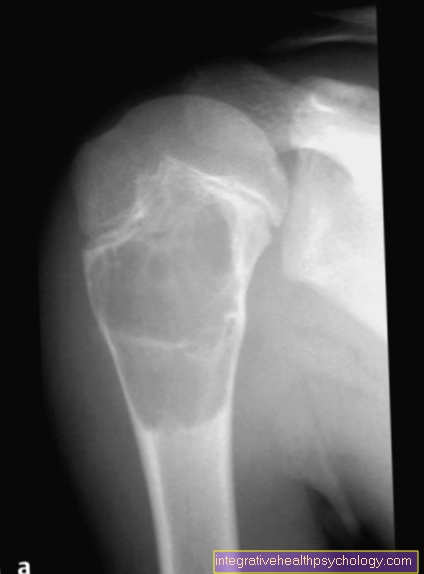Familial Mediterranean fever
Familial Mediterranean fever is a genetic disease that is associated with frequent attacks of fever. The disease is counted among the autoinflammatory diseases, since the immune system is activated independently of a pathogen and causes inflammation.Overall, familial Mediterranean fever is a rare disease, which, however, occurs more frequently in certain regions and population groups. This gives the disease its name, as the regions affected are particularly Turkey, Armenia, Italy and the United Arab Emirates. Familial Mediterranean fever is a chronic disease.

causes
Familial Mediterranean fever is an autosomal recessive inherited disease. Everyone has two variants of each gene. One from the mother and one from the father. The gene that codes for familial Mediterranean fever is not just a single gene. Many different genes have been found. However, one diseased gene is not enough to cause the disease to break out because the carriers still have a healthy gene. If both parents are carriers of the mutation, it is statistically the case that every fourth child has both genes affected. The disease breaks out in these children. This is completely independent of the gender of the children as it is an autosomal disease and both men and women have each gene duplicated.
A particularly large number of gene carriers live in certain regions. In Turkey, for example, every tenth person carries a mutation for familial Mediterranean fever. This means that around one in 400 children has the familial Mediterranean fever. The mutations lead to the immune system being activated regularly, triggering inflammation and attacks of fever. The inflammations particularly affect the peritoneum, the pleura, the pericardium and the joints.
This article might also interest you: Fever without symptoms in adults- what's behind it?
diagnosis
It often takes a few months or years for familial Mediterranean fever to be diagnosed. Those affected often come to the clinic because of acute abdominal pain and fever attacks.
After ruling out other causes of the fever, a screening test may be done to look for the most common gene mutations. However, if the test result is negative, familial Mediterranean fever cannot be ruled out, as only around 80 percent of those affected react positively.
Also read the article: The genetic examination.
How do you find a specialist?
The specialists who deal with familial Mediterranean fever are usually rheumatologists. In most cases, contact can be made directly through the family doctor, pediatrician or the clinic. Internet research is recommended for your own search. There are pages of self-help groups and information pages on the Internet that offer a specialist list radar and can also provide contacts when approached directly. Since the frequency of familial Mediterranean fever is very low in Germany, there are only a few specialists who specifically specialize in this disease.
What are the symptoms?
For most of those affected, the disease breaks out in their youth. Over 90 percent of all those affected have their first fever before their twentieth birthday. A fever attack usually lasts two to three days and occurs suddenly. In some sick people, a flare-up can be triggered by certain food, cold, warmth or overexertion. The fever attacks are accompanied by severe pain in the abdomen, chest or joints, as inflammation develops here.
The history of those affected often includes appendic surgery and other abdominal scars. These operations were carried out on those affected, as they are often admitted to hospital with symptoms of an acute stomach before the actual diagnosis is made. In addition to peritonitis, there are also pleurisy with respiratory pain and pericardial inflammation with heart attack-like symptoms.
Also read the article on the topic: Abdominal pain and fever
The synovium can also be affected. It is noticeable here that it is almost always just a single joint. Especially on the feet, there are also small reddish skin changes during an attack. An indication of familial Mediterranean fever is also provided by the family history of the person affected, as there are often relatives who are already affected. Origin can also make the disease more likely.
Treatment / therapy
Familial Mediterranean fever is a chronic disease that cannot be cured. The therapy is therefore purely symptomatic, i.e. to improve symptoms and reduce relapses. In the active episode, those affected are treated with painkillers. If the non-steroidal pain relievers are insufficient, treatment with opioids may also be considered. Anti-inflammatory therapy with ibuprofen, aspirin or diclofenac is also important.
Depending on the inflamed organ, additional therapies may also be necessary. With an inflammation of the pericardium, the heart can be so restricted that it comes to arrhythmias, which must be treated with medication.
Further information on the subject can be found at: Pericarditis
In between attacks, those affected feel healthy and have no complaints. During this time, however, the frequency of relapses can be reduced with colchicine therapy. Another drug used to prevent relapse is anakinra, a human interleukin-1 receptor antagonist. Studies have shown a positive effect on thrust frequency. A lower number of attacks leads to fewer complications, such as amyloidosis and the resulting kidney failure. Dialysis may be necessary after the long-term effects occur.
What is life expectancy like?
With good drug control, those with familial Mediterranean fever can have a normal life expectancy. However, in slightly more than half of those affected, the frequent relapses lead to a massive release of amyloid A, an acute phase protein. This can accumulate in the kidney and thus lead to renal insufficiency and renal failure. This is often the reason for a shorter life expectancy for those affected.
Find out more about the topic as well: Renal insufficiency
Course of disease
Familial Mediterranean fever is a periodic disease. In childhood, fever attacks are often the only symptom. Later, the relapses are accompanied by inflammation of the peritoneum, pleura or joints.
Between the attacks, those affected feel healthy and are symptom-free. In the late course of the disease, there may be an underactive kidney, which turns the purely periodic disease into a permanent limitation of those affected.
How contagious is familial Mediterranean fever?
Familial Mediterranean fever is a genetic disease. The disease can therefore only be passed on from parents to children. There is no infection to other people, as with the flu or other infectious diseases. Transmission is not possible through blood or other contacts. Anyone who gets family Mediterranean fever has this information in their genes since they were conceived and can only pass this disease on to their own children.
Is there a cure?
Familial Mediterranean fever is a chronic, inherited disease. A cure is not possible here. Those affected are only treated symptomatically and the disease can be narrowed down. Treatments of genetic diseases with the help of gene scissors are still the subject of current research.
Recommendations from the editorial team
- Fever with no other symptoms
- How can you lower a fever?
- Home remedies for a fever
- Body aches
- Causes of fever





























